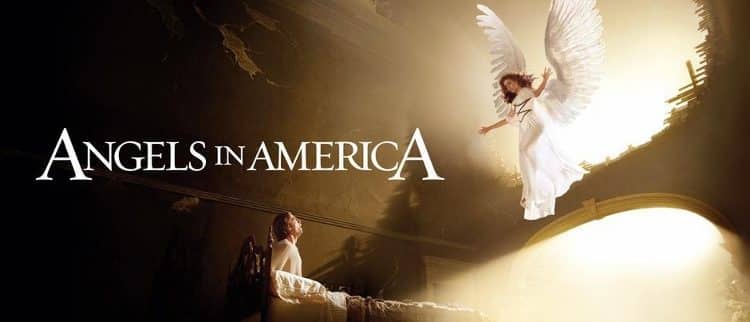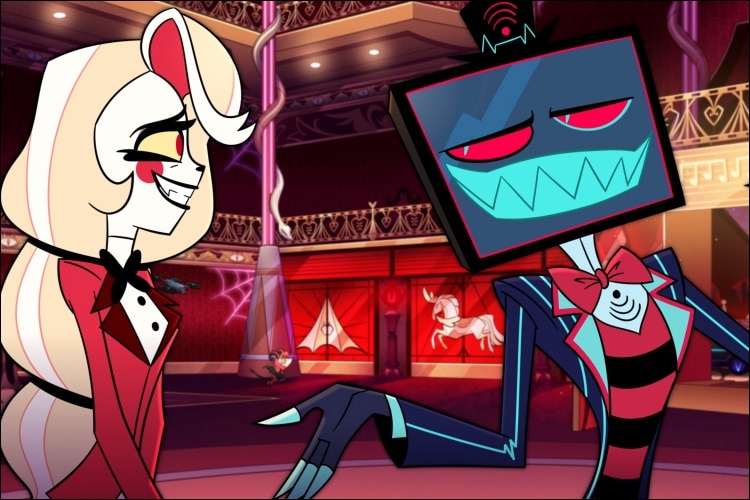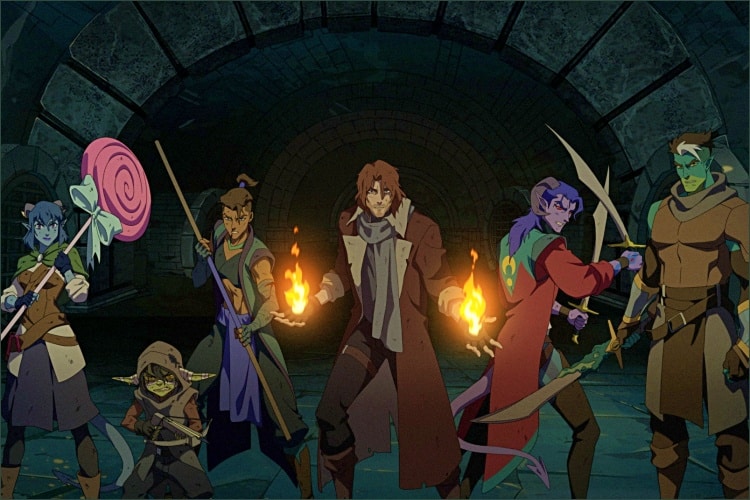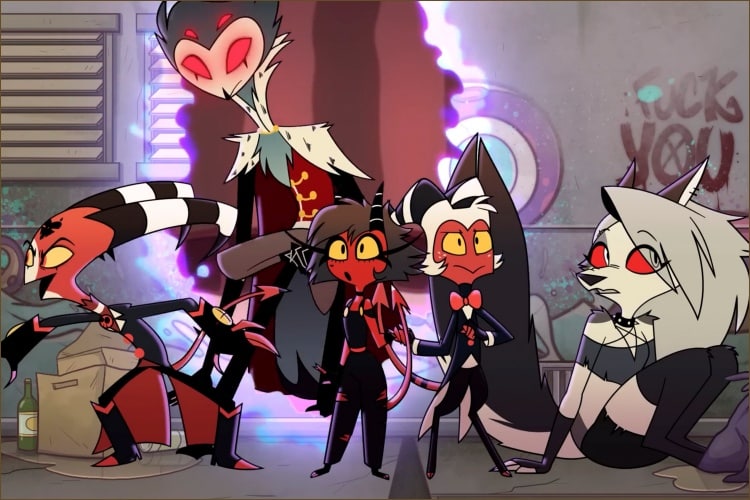A Small Screen Masterpiece
Main Cast: Meryl Streep, Emma Thompson, Al Pacino
Director: Mike Nichols
Angels in America was originally a stage play penned by Tony Kushner. Kushner turned his play into a six hour miniseries production for HBO. The setting is New York City in 1986. In the opening scene we meet Louis (Ben Shenkman) and Prior (Justin Kirk) at the funeral of Louis’s grandmother. This opening has an old, withered Rabbi giving a searing tribute to those who crossed to America from the “old country” and the legacy that their children and grandchildren will always carry.
It’s an incredible scene, with still black and white photographs punctuating the old man’s wheezing, mesmerizing words. Though it has little to do with the substance of the film, it’s a magnificent scene, setting the standard of excellence that will be the hallmark of this film through to the end. After the funeral, we peek into the lives of Louis and Prior. After being together for four years, Prior has discovered that he has AIDS. All the witty banter and easy rapport of the past falls away in a single moment. Welcome to Angels in America.
Angels in America is built around a select handful of characters. These characters are so spectacularly drawn that they deserve to have this review devoted to them. Individually.
Prior
Prior is a WASP from an incredibly long line of WASPs. He’s blithe and witty. He isn’t particularly stoic about his illness. He’s sick, he feels awful, he needs and wants comfort. Prior hurts and bleeds and eventually begins an active dream (are they really dreams?) life that both arouses and terrifies him. Yet he isn’t all about pathos, he’s genuine and funny and acerbic. Prior turns out to be our central character.
Louis
Louis is a born and bred New York Jew. A little stereotypical perhaps in his political leanings, but very witty and smart. It is Louis who provides many of the film’s numerous funny one liners. It’s this character that is most human, most flawed, most conflicted. He does the unthinkable and knows it’s unthinkable. Yet through his own self-flagellation (and the flagellation of others, which to be honest he more than deserves) he tosses in biting bits of dialogue. Through the force of his personality we understand why he is loved – at least by those who don’t detest him.
Roy Cohn
Yes, an actual person. Al Pacino is Roy Cohn, playing him as a ruthless, arrogant, power-hungry bastard. Roy is the personification of the non-discriminatory nature of AIDS. The powerful being just as susceptible to the disease as the powerless, and just as unable to understand or conquer it, despite having massive resources at his disposal. Roy is the slimiest character you’ll meet here – or possibly anywhere. He’s a bigot, a liar, a cheat, a felon. He manipulates others and the system for his own ends and revels in his ability to do so. He’s haunted by the ghost of a gleeful Ethel Rosenberg, who he sent to the gas chamber and who delights in his suffering.
Joe Pitt
Joe (Patrick Wilson) is a sort of protégé of Roy Cohn. Young, conservative, and Mormon, Joe is massively confused by his life and the expectations of his mentor. He wants to be in the heart of power, revels in the prospect of Reagan-era America yet can’t quite bring himself to do what it takes to live in the world of politics. He is a lawyer who has been chief clerk to a Supreme Court justice for too long and wants more for himself, but is unprepared for what that will involve. It doesn’t help that Joe has secrets – big secrets – that affect every part of his life.
Harper Pitt
Harper (Mary-Louise Parker) is the emotionally fragile wife of Joe. She takes too much Valium, is afraid of nearly everything, and has elaborate dreams/hallucinations. Often her comments have little to do with the topic at hand, yet have an eerie prescience about them. Harper and Joe moved to New York City from Salt Lake City and Harper feels this displacement acutely. She knows there are things about her husband that aren’t quite clear to her, but lacks the strength to dig deep enough to find out what they are.
Belize
Belize (Jeffrey Wright) is a friend of Prior. He also happens to be a registered nurse well versed in the world of AIDS from a health care perspective. Belize becomes central to the lives of all these characters, in one way or another, with his wise words and unspoken compassion always tempered by his own personal like or dislike of the individuals involved. This is the character with the least amount of personal story here, but with a great deal of binding power for the other characters.
There is one thing all these characters have in common. Each stays true to the sense we get of them at the beginning of the film. Not one of them undergoes some sort of deification as they are ravaged by illness or grief or fear or uncertainty. They act and react as people would – with fallibility, self-pity, longing, and hurt. There are no pat conclusions, or easy denouements.
There are only connections – some surprising – that make sense from the place of each character. They grow and change, but what they don’t do is become something holy as a result of hardship. That one thing, that making and keeping the characters earthbound and flawed, raises Angels in America head and shoulders above so many “disease” movies. We may love these people, we may hate these people, but we recognize these people. They are who we are, just distilled into a handful of archetypes.
There are a multitude of peripheral characters as well. Meryl Streep as Joe’s rather cold and straightforward mother, Emma Thompson as Prior’s nurse, as well as some angels who pop up now and again. Each and every one of these performances is absolutely outstanding. Nearly flawless. The actors embody the characters completely, without a slip, without a crack.
An actor that earns special mention is Justin Kirk as Prior. Kirk is an obscenely handsome man. Yet this part doesn’t require him to be that. It’s truly unusual to see a beautiful actor cast in a role that doesn’t somehow play on that beauty. Kirk was cast here because he can act; his physicality has nothing to do with it.
Actors like Streep and Pacino and Thompson melt into their roles so effortlessly that they could be any anonymous actor. Except that no anonymous actor could do what they do here. They breathe life into these people, make them more than real. Meryl Streep, in particular, is spectacular. As unfathomable as it may seem, I think this might be her finest performance to date.
Angels in America would never work, even with the pest performances in the world, if it wasn’t for the absolute genius of Tony Kushner’s screenplay. He chooses not to tell the tale of the height of the AIDS epidemic in America in any traditional way. He weaves and loops and creates a world at once brutally realistic, achingly funny and gloriously surreal.
As Prior begins to encounter the angels in his dreams/visions, we begin to understand exactly what those angels are. They are fear. Throughout the film, character after character begs and pleads for things to go back to the way they were. The angels take this on and make it whole. The film stands up head-on to the fevered wish of a nation to have things back the way they were. A people always wishing for the past, afraid of the future, afraid of the present. In the late 1980s, nothing personified that ever-present fear more than the AIDS epidemic.
Kushner pulls in this diverse group of characters, spins a lot of bitingly pseudo-religious type rhetoric into a message of a scared populace, and soundly trounces both the fear and the misplaced targeting of gay men by those who long for a past that was never as beautiful as they want to remember it being. It’s a glorious thing to watch, made more glorious by Mike Nichols’ steady hand at the helm. He lets this story fly, without reining it in with too much overt staging. The conversations look and feel genuine, the special effects enhance instead of distract, and the camera is sure and controlled. There is a beautiful mix here, between the personal and intense feel of a stage play and the visually creative freedom of a film.
The production values are absolutely top notch. The surreal sequences are a combination of the beautiful and the absurd, the portrayal of illness and death heartbreakingly stark and without soft edges. The blurring of reality with dream/hallucination/vision is sometimes subtle, sometimes jarringly obvious. Both work – the situations rely on it.
The characters occasionally spin out monologues in faux-religious type style. The words are deliberately vague, sometimes archaic in form, yet the meanings are clear and the tones are sonorous, hypnotizing, as is the form the chosen characters take in their presentation. Even the opening credits are intriguing, with a montage of cities across the nation, one after another, seen as if from a diving, darting flight through the clouds. Special kudos also go to anyone and everyone involved in the make-up for this film. Aging, illness, everything is exceptionally well done.
Angels in America is a most unusual beast. It tackles a serious subject with pathos, humor and more than a good sized dollop of absurdity and surrealism. It gives breath to some of the most realistic characters, despite some of their extraordinary circumstances, I’ve ever seen. It captivates for six hours – believe me, you’ll want to watch it all once you start – amazing with both content and performances.
The actors involved are an absolute marvel, weaving these characters into people who are sad and funny and wise and ignorant all at the same time. More than anything else, it shows in its own very unique way what it was like for gay men in this country at the height of the AIDS epidemic, before it fell off the front pages. It shows us (in the general sense – as a populace) all for what we were, frightened children who wished over and over again for things to go away, for a romanticized past.
And it shows just how strong were those who resisted the plaintive pleas of the frightened that they lie down and die so that no one would have to be scared of them anymore. Not a story of triumph, this is a story of perseverance, of the desire to live, of the fact that “the world only spins forward”, and that the future is worth hoping for simply because it means that you’ve lived long enough to see it. Angels in America is a small screen masterpiece.

Sue reads a lot, writes a lot, edits a lot, and loves a good craft. She was deemed “too picky” to proofread her children’s school papers and wears this as a badge of honor. She is also proud of her aggressively average knitting skills. TV and indie movies are her jam.






Leave a Reply